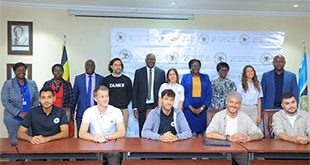
By Independent Team & Agencies
Shs 50bn exports threatened as American senator asks EU to join trade blockade
After reviewing legislation being considered by the Ugandan Parliament that would imprison citizens for being Lesbian, Gay, Bi-sexual and Transgender, U.S. Senator Ron Wyden, Chairman of the Senate Finance Committee’s subcommittee on International Trade, Customs and Global Competitiveness indicated that if Uganda passes such a law, it will be in violation of the African Growth and Opportunity Act (AGOA).
The AGOA law requires requires that beneficiaries not engage in “gross violations of internationally recognised human rights.”
Although engaging in a homosexual act is a criminal offense uner the Uganda penal code, America and some other country’s take a more liberal approach.
AGOA grants Ugandan imports to the United States duty-free status, which Wyden says should be revoked if Uganda moves forward with the Anti-Homosexual law.
Uganda has been a beneficiary under AGOA since its passage in 2000. President Museveni was an early and active proponent of the legislation and Uganda has been among many of the sub-Saharan African countries that have benefited from the duty-free treatment that AGOA provides to over 90 percent of the products from sub-Saharan Africa.
However, Wyden threat even if carried out is unlikely to have a big impact on the Uganda garment industry.
Uganda has barely benefitted from AGOA due to corruption and incompetence in its internal cooperation and competition from more efficient exporters to the US.
According to information from the AGOA website, the customs value of garment exports from Uganda to the USA rose from US$27 million in 2007 to US$53 million in 2008. However, year on year value dropped by about 30 percent to US$ 26 million (Approx. Shs 50 billion) in last year.
In a letter to Secretary of State Hillary Clinton and U.S. Trade Representative Ron Kirk, Wyden writes: “I strongly urge you to communicate immediately to the Ugandan government, and President Yoweri Museveni directly, that Uganda’s beneficiary status under AGOA will be revoked should the proposed legislation be enacted.”
Wyden has called on Secretary Clinton and Ambassador Kirk to determine if the European Union will reconsider its trade preference program for Uganda in the event this legislation is passed. He intends to sponsor legislation to amend U.S. trade laws to preclude countries that fail to adequately respect sexual orientation and gender identity as human rights from benefitting from any U.S. trade preference scheme.
The House Committee on Ways and Means and the Senate Committee on Finance are seriously considering proposals to reform U.S. trade preference programs and Wyden has been active in those discussions.
“Before us is a concrete opportunity to demonstrate our commitment to ending violence and discrimination against LGBT persons worldwide,” Wyden continued in the letter.
However, The EastAfrican newspaper reported recently that Uganda garment industry is shifting the focus of its apparel exports from the United States to East Africa and Comesa.
It said despite a quota free and duty-free market offered by the US under the Africa Growth Opportunity Act (Agoa) deal Uganda says the shocks its textile industry has experienced from the global meltdown and unfair competition have forced them back on the drawing board to define better markets and different strategies.
It quoted the presidential advisor on Agoa Suzan Muhwezi saying the change in market positioning is in line with last year’s Agoa forum meeting in Nairobi where a number of African countries were urged to concentrate on their home and regional markets rather than rely on the US which was turning out to be an unreliable market.
“There has been a global drop in apparel exports to the US because of the economic crisis. It is better to concentrate on regional markets like the EAC and Comesa. It is now easier because we have improved our quality of apparels,” she said.
Under AGOA, the US government opened up an $11 trillion-market to duty-free and quota-free access for more than 4,500 products from 48 sub-Saharan African countries five years ago.
Uganda is offering incentives, including a 10-year corporate tax holiday, a 5-year value added tax exemption on all inputs, a revolving cotton buffer stock fund of US$3 million annually, a subsidy of US 5 cents per KWH for three years and a loan of $5 million to attract foreign manufacturing textile firms onto the market.
 The Independent Uganda: You get the Truth we Pay the Price
The Independent Uganda: You get the Truth we Pay the Price


